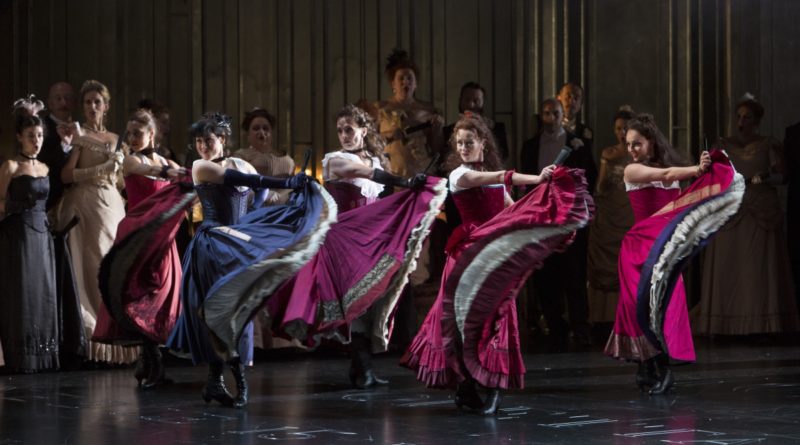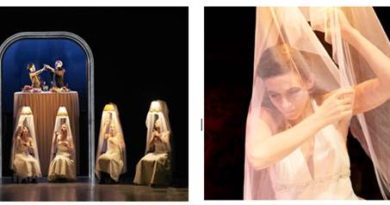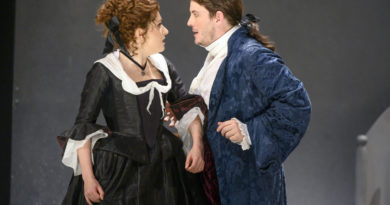La Traviata at the Bristol Hippodrome
I’ve come to the conclusion that opera is essentially musical theatre with knobs on. You have all the elements – spectacle, dance, storyline and music, but the music is taken to another level. Being just a few rows away from an entire orchestra is an incredible experience, from the anticipation that comes from the discordant noises of the tuning and warming-up to the sight of multiple violin players working in such perfect unison that they sound like one. And on top of all that you get the voices and that is another world entirely. I’ve seen enough operas now that I’m starting to get more confident about assessing whether something is technically good as well as whether I’ve enjoyed it. I thought that the performance of La Traviata was perfect last night but I still asked the rather nice chap next to me who was very obviously a true opera aficionado for his opinion; he said it was an excellent performance. To be honest I’d expect nothing less from the Welsh National Opera but it’s always nice to have it confirmed by someone who knows. (Incidentally that’s another thing I’ve learnt about opera in the last few years. It’s not elitist, there is always a wide range of types of people and some of them dress up and some don’t. Sometimes I’m sat next to someone with a cut-glass accent and pearls, sometimes it’s a casual shirt and jeans. But one thing that I’ve always found is that if I talk to my neighbours in the interval and explain that I’m new to the opera world they will give me recommendations for things to see, tell me what they love about the current performance and generally share their enthusiasm. It’s a beautiful thing.)
So, La Traviata. I was a bit apprehensive because my tastes generally run more to the jolly and colourful than to great tragedy. In this story there is a beautiful, rich and successful woman, Violette, who has achieved what she has by being a courtesan. She falls in love with a young man, Alfredo, after he makes it very clear that loves her, and they leave the life of luxury behind to live in the country together. However, bills still need paying and Alfredo finds that Violette is selling her possessions to pay their expenses. He immediately leaves for Paris to make other arrangements but while he has gone his father turns up to speak to Violette and ask her to leave him. She gains his respect by showing that she is not spending Alfredo’s inheritance as he thought, and also being willing to leave for the sake of Alfredo’s sister and Alfredo’s own reputation which is suffering as a result of being involved with a fallen woman. There is some emotional blackmail here that makes me uncomfortable: it is apparent that the issue with the sister is that she wants to marry a man who also loves her, but he wants to call it all off because he disapproves of his future wife’s brother’s choice of partner. I guess this sort of thing still happens but maybe less openly. The consequence of all this is that Alfredo returns to an empty house, Violette returns to the Baron who was her previous partner and takes up her old life and both are deeply unhappy. Alfredo decides to confront her, turns up at a party and behaves very badly, winning money from the Baron and throwing it in Violette’s face saying that he had repaid his debts to her in full. She is humiliated, the party guests are horrified at his behaviour, Alfredo’s dad turns up and tells his son off for treating such a fine woman so badly and the Baron challenges Alfredo to a duel. Underlying all of this is the knowledge that Violette is ill. In the final act an unspecified amount of time has passed and Violette is now in the final stages of consumption. She is coughing up blood and has been told she has only hours to live. She has had a letter from Alfredo’s father saying that Alfredo wounded the Baron in the duel, and that he now knows the sacrifice she made for him and his sister and they are coming to see her. Violette is waiting and waiting but it is too late. They arrive in time for Alfredo and Violette to declare their love for each other again and then she dies – of course. This is opera after all.
What isn’t clear from this synopsis is that as well as being deeply moving and tragic there are also moments of laughter and comedy during the first and second acts. Notably this includes a troupe of dancing gypsies and a Spanish matador who come to perform at one of the parties. The matador is arrogant, womanising and apparently very proud of his bottom. It is a fine bottom, muscular, large and frequently thrust wiggling in the audience’s direction. I may be a little bit in love with Juan Dario Sanz Yague, the dancer who played this part. This wasn’t the only time that dancing featured and in fact one of the things I’ve grown to love about opera is the big crowd scenes where you have perfectly choreographed movement of large numbers of people on the stage. When the chorus sings it is a wall of sound, multi-layered and indescribably beautiful: the fact that they can produce such noises and simultaneously dance never ceases to amaze me. The party scenes were awesome. The set was also sumptuously beautiful with strong but muted colours throughout. I was particularly struck by the simplicity of the set for the final act where Violette is in penury and dying in bed. There is a gauzy window behind which shadowy characters can be seen, symbols of life moving on that Violette can no longer be part of. There are curtains draped to frame the scene. There is a bed with items scattered around it and bedding on the floor for Violette’s maid, Annina. There is a pot next to the bed which Violette uses for the bloodstained cloths she coughs in to. There is so little there, but it conveys so much suffering, loss and ending.
At this point I feel I should be giving a list of names and who they played and how great they were, but I’m not going to. The cast, the designers, the orchestra, the conductor, the various technicians and make-up artists and all the others that work to make things like this happen – they were amazing. All the elements were perfect and they came together to create something sublime.
I am easily distracted and sensitive to noise; things like the sound of people eating can drive me to distraction. I expect people to cough, that’s something that happens to all of us, but I do usually notice every off-stage noise. Last night I noticed nothing, no coughs or any other sounds. It was only when the lady next-but-one to me was apologising to people around that I became aware that she had been coughing constantly, and that apparently wasn’t the only one with a ticklish throat. I noticed none of it. None at all, not in any act. I was so wrapped up in what was happening on stage that the rest of the world didn’t exist.
That’s what I call a great show.
Review by Ginny Gould




